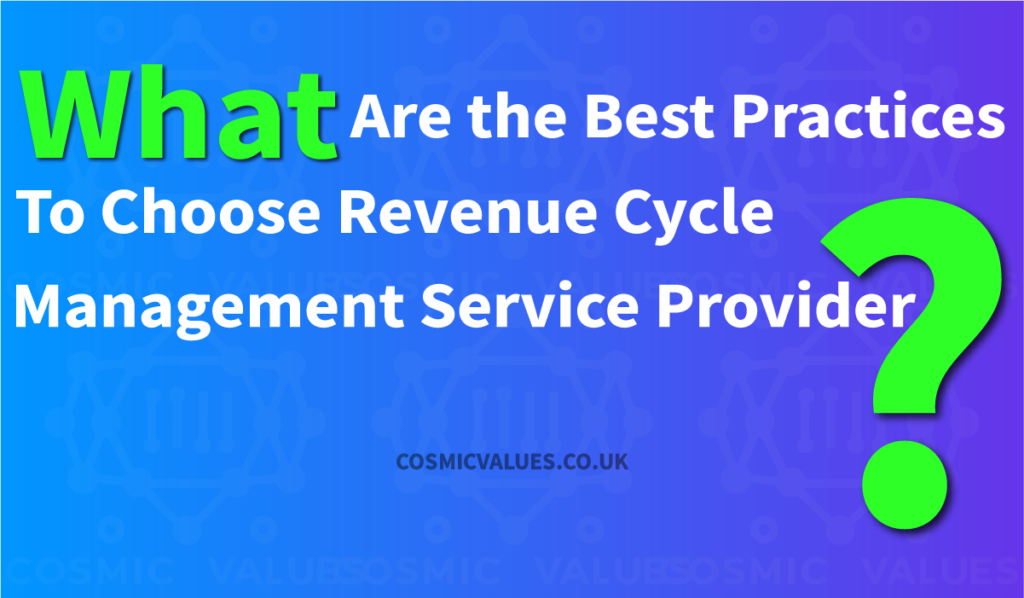For the past two decades, the healthcare industry has faced a massive transformation driven by technological advancements and changing patient expectations. Almost all procedures, i.e., administration, revenue cycle management, etc, are becoming digital.
However, with new technologies emerging at an unprecedented pace, healthcare providers are facing the challenge of selecting the right tools and solutions to meet the needs of their patients. Choosing the service provider is also very important because going with a service provider that can’t cater to the specific needs of a practice will be a waste of time and money.
Choose Revenue Cycle Management Service Provider
In this blog post, we will enlist the step-by-step procedure to choose the revenue cycle management services provider that will meet the needs of your healthcare practice.
1. Defining Your Needs
Before looking for an RCM service provider, it is crucial to analyze your practice’s specific needs comprehensively. Start by evaluating your current workflow, identifying pain points, and setting clear objectives for improvement. The more precise the goals, the clearer you know what you will be expecting from your revenue management system.
Collaborating with PracticeEHR, you can leverage our expertise to conduct a needs assessment tailored to your practice. This ensures that your RCM solution aligns perfectly with your unique requirements.
2. Comprehensive Revenue Cycle Management
Good RCM services are designed holistically, addressing the entire revenue cycle to provide a unified and efficient experience for medical practices.
A successful RCM system should offer end-to-end solutions, covering every aspect of the revenue cycle. From patient registration to claims processing and denial management, a comprehensive RCM system ensures seamless integration and minimizes disruptions in your revenue cycle.
3. Integration Capabilities
Efficient interoperability with your existing Electronic Health Record (EHR) system is paramount. PracticeEHR guarantees a seamless integration process, minimizing data silos and enhancing overall operational efficiency.
For example, the PracticeEHR RCM solution seamlessly integrates with your EHR software, streamlining your practice’s workflow and ensuring a practical approach to patient care and revenue management.
4. Financial Reporting and Analytics
Selecting an RCM service provider that provides robust reporting and analytics tools is essential because financing is the most important aspect of the operations of any practice. Access to real-time financial data empowers your practice to make informed decisions, identify trends, and optimize revenue streams. PracticeEHR’s RCM system includes advanced reporting and analytics features, allowing your practice to gain actionable insights into its financial performance.
5. Revenue Optimization Strategies
An effective RCM service goes beyond merely processing claims; it should work to optimize your revenue. Considering the developments in healthcare, this RCM software should employ advanced algorithms and industry best practices to identify opportunities for revenue enhancement.
6. HIPAA Compliance
Health Insurance Portability and Accountability Act (HIPAA) compliance is non-negotiable in the healthcare industry. Failing to meet HIPPA compliance can lead to grave circumstances like losing the practice’s license and hefty financial penalties.
Ensure that your RCM provider adheres to the best possible standards of data security and patient privacy. PracticeEHR prioritizes HIPAA compliance, implementing robust security measures to safeguard your practice against potential legal and financial repercussions.
7. Regulatory Adherence
The healthcare field constantly evolves with new regulations, especially in the USA, where healthcare authorities keep updating the regulatory rules and regulations. Choose an RCM partner that stays abreast of the latest developments and adjusts its systems accordingly. For example, PracticeEHR consistently updates its systems to align with industry regulations, ensuring your practice remains compliant and avoids unnecessary risks.
8. 24/7 Support Services
Unexpected issues can arise at times, emphasizing the importance of round-the-clock support. Ensure your RCM provider offers 24/7 support services to address concerns promptly.
9. User Training and Resources
A user-friendly system is valuable only if your team can leverage it effectively. Look for an RCM partner that provides comprehensive training resources. Service providers must offer extensive training programs to maximize your team’s proficiency with our platform, ensuring a smooth transition and the best possible utilization of our RCM services.
10. Trial Period and Scalability
Opt for an RCM service provider that offers a trial period. This allows you to assess the system’s compatibility with your practice’s unique requirements. Choose a provider that can scale its services as your practice grows. PracticeEHR’s flexible solutions cater to practices of all sizes, providing scalability and adaptability to meet the evolving needs of your healthcare practice. Our solutions not only start from a very minimal cost, but with that, we offer a trial period no matter what the nature of the operations of your practice is.

Conclusion
In conclusion, choosing the right Revenue Cycle Management service provider is a strategic decision that directly impacts the financial well-being of your practice.
By following these ten practices and considering PracticeEHR’s comprehensive and customizable solutions, you can confidently navigate the landscape of RCM, ensuring the long-term success of your healthcare practice.
Embrace the future of healthcare management with PracticeEHR, your trusted partner in optimizing revenue cycles and enhancing patient care.



